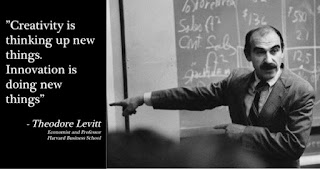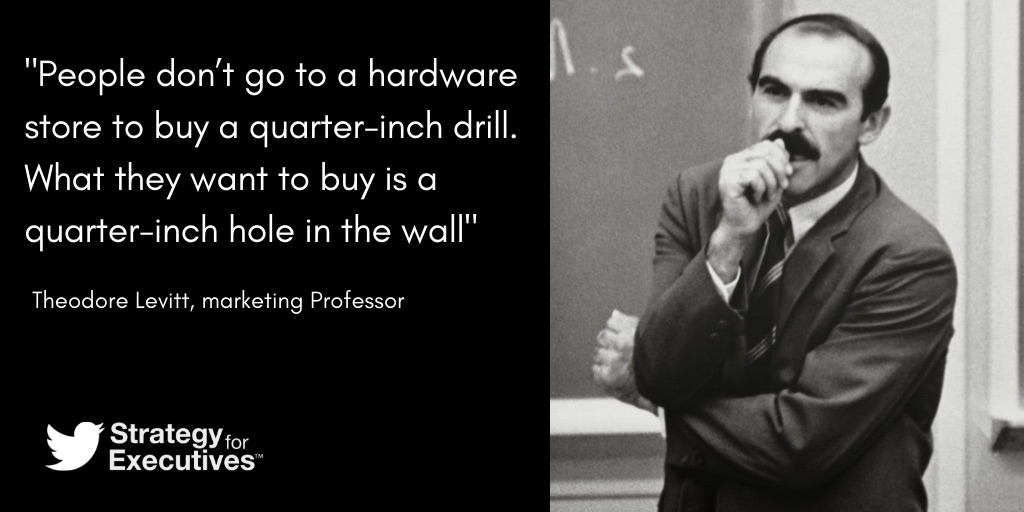Corporate purpose:
‘Rather than merely making money, it is to create and keep a customer.’
Theodore Levitt
Some years ago, I came across the work of Harvard Business School professor, Theodore Levitt. He was a German-born American economist and editor of the Harvard Business Review. Among his other achievements Mr Levitt wrote an article called Marketing Myopia in which he raised some fascinating points about business—particularly big business—and why it fails.
Mr Levitt pointed out that “the history of every dead and dying ‘growth’ industry shows a self-deceiving cycle of bountiful expansion and undetected decay.” At some point every industry could be said to be booming but then it died away. Usually this was because markets change and the industry failed to adapt, or because they became so fixated on mass-producing and selling their existing product that they no longer concentrated on the wants or needs of those buying that product.

Henry Ford’s genius
Henry Ford is credited with inventing the first mass-production line for his cars. In fact, his real genius was looking at what his customers—or potential customers—wanted and realising that if he could sell a car for $500 he could sell millions of them. The production line grew out of that need to cut costs in order to sell at such a low price, but the marketing strategy came first.
Mr Levitt examined the railroad industry in the States, which he suggested fell into decline because it saw itself firmly as being in the railroad business instead of in the transportation business. It thought about what it was producing, not what its customers wanted, which was simply to get themselves and their goods from A to B as quickly and cheaply as possible.

Likewise, the petroleum industry is really in the energy business, whether that incorporated gas, nuclear, solar, or geothermal energy. To cling to the past will ensure that new giants emerge and eventually kick the old giants to the kerb.
The long and the short of it is, if you think of yourself as producing a product rather than satisfying a customer, you are eventually doomed to failure.

But the most remarkable thing about all this is that Theodore Levitt wrote Marketing Myopia in 1960. It seems very little has been learned since then.
TV and the Movies
A website called Digital Marketing summarized Mr Levitt’s original piece with the additional comparison of Hollywood and the TV industry. Those Hollywood studios who saw themselves as producing movies and nothing else floundered. Those who moved into other areas of the entertainment industry seemed to have, on the whole, thrived. (And I realise there will always be exceptions to this rule.)
Writer of books or teller of tales?
That brings me to authors and books. To me I am not a producer of books, I am a teller of stories. How people absorb those stories is almost immaterial—it could be via hardcover, paperback, car stereo, MP3 download, iPod, Kindle, tablet, PC, smartphone, or cortical implant—and I can see that happening in my lifetime, I can tell you. At the end of the day it’s the story that matters, not the delivery system.
I think, at the start of the digital revolution—when eBooks first started to take off—there was a bit of a backlash from some traditional publishers who saw themselves as producers of books rather than providers of stories. They argued that eBooks would kill publishing. Ten or eleven years later, the number of authors, and stories published, has increased enormously.
Initially, the advent of indie publishing meant that authors were free to write what they fancied, rather than what the publishers saw as the most profitable genres. Cream tended to rise to the top, and good books—or those that filled a hitherto unplugged gap in the market—did amazingly well.
Too much of a good thing?
The monetisation of search engines, which make customers pay for visibility, has altered that paradigm somewhat. Now it is not necessarily the best, but the best-marketed works who achieve the best sales. Still, the choice is mind-boggling.
In bookstores in the States, I was always taken aback by the number of categories and genres into which books were divided up. In the UK it tended to be Crime & Thriller and True Crime. In the USA there were far more to go at, from Cosy (or should that be Cozy?) to Hardboiled to Noir to PI, Police Procedural to Amateur Sleuth, Woman-in-Jeopardy, Serial Killer, Bodyguard, Vigilante, Investigative Reporter, Slasher/Shocker … the list is endless.
And that does not include all the crossover titles, with vampire detectives, werewolf private eyes, ghosts, zombies, witches, wizards and otherworldly beings who delve into the life (or undeath) of crime. Your main protagonist is just as likely to be keeping the peace on a distant space station as at a California Hellmouth, or to use magic rather than deductive reasoning.
This all leaves me with some interesting questions. Who or what is leading the market now? With such a wealth and breadth of cross-genres and sub-genres out there, are readers finding more of exactly what they want (even if previously it fell between the cracks of established categories) or less?
Do you feel mainstream crime books are tending to crowd into a mould of what has been previously successful, or are we seeing more imaginative themes being explored? Has the indie/self-publishing revolution given you more choice? Or is it simply harder to find what you’re looking for because of sheer volume?
What do YOU, as a reader, want to read?
Writer’s purpose:
‘Rather than writing books, it is to create and keep a reader.’
This week’s Word of the Week is anecdote, meaning a short humorous story without the need for factual or biographical origins. It comes from the Greek for ‘unpublished’ or ‘not given out’, and is said to have been originated by Greek scholar Procopius of Caesarea, who produced a work called Anekdota, variously translated as Unpublished Memoirs or Secret History. Gradually, the term came to be applied to any short tale used to emphasise or illustrate whatever point the author wished to make.
You can read this blog, or comment, at Murder Is Everywhere